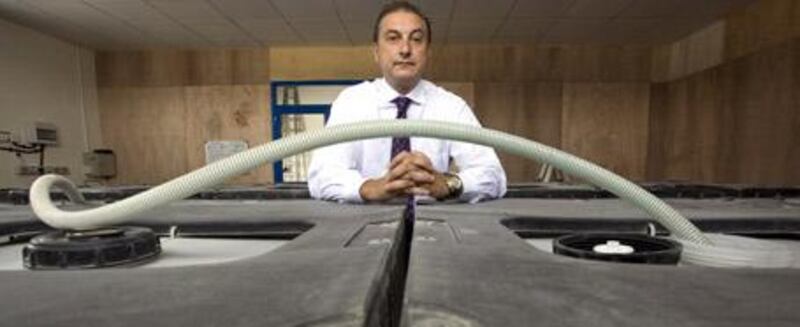The Dubai businessman Peter Manzi has a deviously simple plan to clean up. On a recent Monday afternoon, I watched as a shopper stood in the Géant hypermarket in Dubai, contemplating an expanse of window-cleaning products. First, the man picked up a spray bottle containing a blue liquid and examined the ingredients, then he did the same with purple and pink. The bottles of Clearwater, a colourless glass cleaner located on one of the lower shelves, went unexplored. Purple it was.
Clearwater, which is currently being produced in Dubai by an Englishman named Peter Manzi, could very well be the eco-friendliest household cleaner on the planet. In fact, I've just taken a swig of the stuff, and I'm fine. This is probably because Clearwater is just, well, clear water. As the bottle informs, it's "100% Chemical Free". Manzi insists that there is more to his product than meets the eye. It's gone through a filtering process, one involving complicated-sounding things like reverse osmosis. "Normal drinking water has particles in it - calcium, sodium, magnesium," Manzi explains. "But this is pure water." The idea is that, stripped of its minerals, water attempts to replenish itself with whatever particles it can find. As Manzi puts it: "It tries to revert back to its natural state. It actually draws in the dirt."
Even if this is true, it doesn't fit on a catchy label, so consumers are confronted with something that looks, smells and tastes like the stuff that comes out of their taps. "Yes, this question has arisen," Manzi says. "I've had some comments." Manzi, 49, launched Clearwater glass cleaner six months ago, on the back of a window-washing enterprise he founded in 2007. The Clearwater cleaning company has done well, with corporate contracts that include ENOC and Etihad, along with enough individual clients to keep its 25 employees busy. While his firm isn't the only one using hyper-purified water to clean windows, Manzi says that he's the first to put it into a spray bottle - a leap, he says, that will one day make him a global force in the household cleaner category. "This could be in Wal-Mart or Tesco," he says. "Why not?"
Earlier this year, as part of an expansion drive, Manzi set up a plant in Barsha; according to him, it can produce 75,000 litres of purified water a day, though it might be a while until the plant is working at full capacity. Meanwhile, Manzi's efforts to get local supermarkets to carry Clearwater haven't been entirely successful - all but Geant and Le Marché have turned him down - and he is currently shifting only about 500 bottles a month. "I'm hoping the numbers will go up," he says. "We're looking into advertising, doing a proper marketing campaign."
Despite Clearwater's limited success so far, Manzi says he is confident that his product will soon be able to compete with more established brands. In fact, he adds, his biggest worry is that larger companies will see what he is doing and develop a clear water of their own. "There are only so many ways to filtrate water," he says. "You can't protect yourself against imitators. The only thing I can do is get this product out there, because if the big players thought they could make money, they'd get it out there pretty quick." The environmental appeal alone, he adds, makes Clearwater a very attractive prospect for the future.
"There's a feel about the world now," Manzi says. "If we want to protect ourselves, we need to start using these kinds of products." Consumers, however, have 100 years of conventional wisdom telling them chemicals are uniquely effective at doing things like cleaning windows, that a bottle of household cleaner should be a strange colour, have a distinctive aroma and be harmful if swallowed. "The proof is in trying the product," Manzi insists. "Buy a bottle and try it at home."
I take Manzi's advice and test Clearwater on a balcony door that hasn't been cleaned, to my knowledge, since I moved into my flat over a year ago. As the bottle contains no instructions, I spray it on, leave it for a moment, then wipe it off with kitchen towels. My control group is an adjacent window, which I wash in the same way with ordinary tap water. The tap water window ends up streaky; the Clearwater window doesn't. I wash a third window with a major-brand, blue-tinted glass cleaner, which also leaves the window streak-free. But I don't dare to drink it.
* Chris Wright





